| Anthony Wilson | |
|---|---|
 | |
| Studio album by | |
| Released | July 1, 1997 |
| Genre | Jazz |
| Label | MAMA |
Anthony Wilson is an album by jazz guitarist Anthony Wilson.
| Anthony Wilson | |
|---|---|
 | |
| Studio album by | |
| Released | July 1, 1997 |
| Genre | Jazz |
| Label | MAMA |
Anthony Wilson is an album by jazz guitarist Anthony Wilson.
This was Wilson's debut album. [1] He commented that using a nonet meant that the album "is a record of experimentation, of me finding a sound. I love this instrumentation. It preserves the sound of a small band, but it can sound big when I want it to". [2]
Seven of the 10 tracks are Wilson originals. [1] He also wrote all of the arrangements, except for "The Parisian Knights", which he transcribed from the original Lucky Thompson recording. [1] The album was released on July 1, 1997, [2] by MAMA Records. [3]
| Review scores | |
|---|---|
| Source | Rating |
| AllMusic | |
The AllMusic reviewer concluded that, "overall, this is a highly enjoyable effort, a strong start to Anthony Wilson's career." [1] It was nominated for a Grammy Award in the Best Large Jazz Ensemble category. [3]

Take 6 is an American a cappella gospel sextet formed in 1980 on the campus of Oakwood College in Huntsville, Alabama. The group integrates jazz with spiritual and inspirational lyrics. Take 6 has received several Grammy Awards as well as Dove Awards, a Soul Train Award and nominations for the NAACP Image Award.

Uncle Meat is the sixth album by the Mothers of Invention, and seventh overall by Frank Zappa, released as a double album in 1969. Uncle Meat was originally developed as a part of No Commercial Potential, a project which spawned three other albums sharing a conceptual connection: We're Only in It for the Money, Lumpy Gravy and Cruising with Ruben & the Jets.

Eddie Harris was an American jazz musician, best known for playing tenor saxophone and for introducing the electrically amplified saxophone. He was also fluent on the electric piano and organ. His best-known compositions are "Freedom Jazz Dance", popularized by Miles Davis in 1966, and "Listen Here".
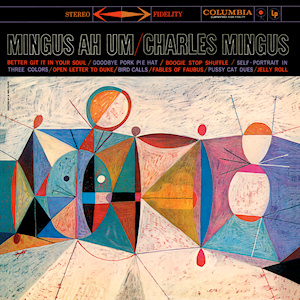
Mingus Ah Um is a studio album by American jazz musician Charles Mingus which was released in October 1959 by Columbia Records. It was his first album recorded for Columbia. The cover features a painting by S. Neil Fujita. The title is a corruption of an imaginary Latin declension. It is common for Latin students to memorize Latin adjectives by first saying the masculine nominative, then the feminine nominative, and finally the neuter nominative singular —implying a transformation of his name, Mingus, Minga, Mingum. The album was inducted into the Grammy Hall of Fame in 2013.

At the Opera House is a 1958 live album by Ella Fitzgerald. The album presents a recording of the 1957 Jazz at the Philharmonic Concerts. This series of live jazz concerts was devised by Fitzgerald's manager Norman Granz; they ran from 1944 to 1983. Featured on this occasion, in 1957, are Fitzgerald and the leading jazz players of the day in an onstage jam session. The first half of the 1990 CD edition includes a performance that was recorded on September 29, 1957, at the Chicago Opera House, whilst the second half highlights the concert recorded on October 7, 1957, at the Shrine Auditorium, in Los Angeles. The original LP obviously included only the mono tracks (#10-18).

Digital III at Montreux is a 1979 live album featuring a compilation of performances by Ella Fitzgerald, Count Basie, Niels-Henning Ørsted Pedersen, Joe Pass, and Ray Brown, recorded at the 1979 Montreux Jazz Festival. It was produced and has liner notes by Norman Granz. The cover photo is by Phil Stern.
Bernard "Barney" Jean Wilen was a French tenor and soprano saxophonist and jazz composer.

William Howard "Monk" Montgomery was an American jazz bassist. He was a pioneer of the electric bass guitar and possibly the first to be recorded playing the instrument when he participated in a 1953 session released on The Art Farmer Septet. He was the brother of jazz guitarist Wes Montgomery and vibraphonist Buddy Montgomery.
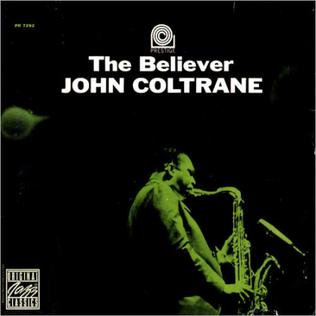
The Believer is a jazz album by John Coltrane released in 1964 on Prestige Records, catalogue 7292. It was recorded by Rudy Van Gelder in Hackensack, New Jersey in 1957 and 1958.

Peter Christlieb is an American musician, playing tenor saxophone in the styles of jazz bebop, West Coast jazz, hard bop and pop music.

The Last Album is an album by Albert Ayler recorded a little over a year before his death in November 1970. Along with Music Is the Healing Force of the Universe, which was recorded at the same session, it was Ayler's last studio album. The Last Album consists of outtakes from that session, and was released posthumously in 1971 on Impulse! Records.
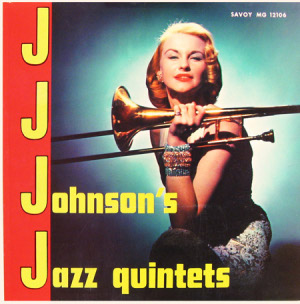
J. J. Johnson's Jazz Quintets is a studio album by jazz trombonist J. J. Johnson, released by Savoy Records, containing material from three different recording sessions in 1946, 1947 and 1949. Material from the first two sessions had been previously released on two Savoy EPs, New Trends In Jazz, Vol. 11 and Birth of Bop, Vol. 3. The album was re-issued on CD in 1992, and again in 1994 on the Savoy Jazz label.

A Tribute to Cannonball is a studio album by jazz pianist Bud Powell and tenor saxophonist Don Byas, released on Columbia in March 1979, featuring a session recorded at the Studio Charlot in Paris on 15 December 1961, with Pierre Michelot on bass and Kenny Clarke on drums, and trumpeter Idrees Sulieman guesting on four tracks. The session was produced by Cannonball Adderley, who would also produce Powell's follow-up A Portrait of Thelonious recorded two days later.
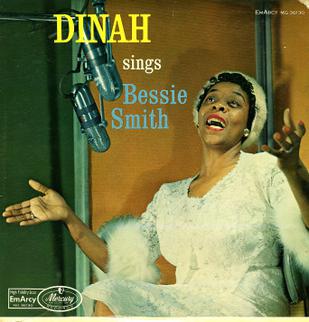
Dinah Sings Bessie Smith is the ninth studio album by blues, R&B and jazz singer Dinah Washington released on the Emarcy label, and reissued by Verve Records in 1999 as The Bessie Smith Songbook. The album arrangements are headed by Robare Edmondson and Ernie Wilkins, and the songs are associated with American blues singer Bessie Smith. AllMusic details the album in its review as saying: "It was only natural that the "Queen of the Blues" should record songs associated with the "Empress of the Blues." The performances by the septet/octet do not sound like the 1920s and the purposely ricky-tick drumming is insulting, but Dinah Washington sounds quite at home on this music".
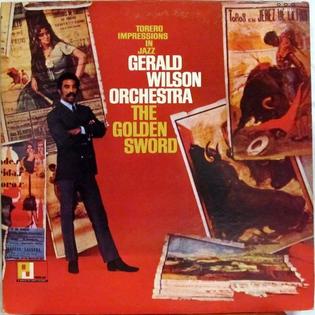
The Golden Sword is an album by the Gerald Wilson Orchestra recorded in 1966 and released on the Pacific Jazz label.

New York, New Sound is an album by the Gerald Wilson Orchestra recorded in 2003 and released on the Mack Avenue label.
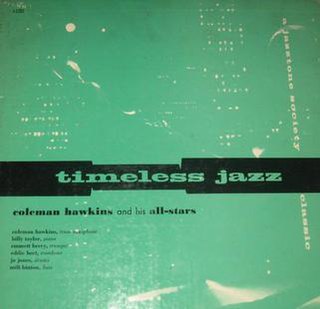
Timeless Jazz is an album by saxophonist Coleman Hawkins which was recorded in 1954 for the mail order Jazztone label and rereleased as Jazz Tones on Xanadu Records in 1982.

Over the Rainbow is an album by New York Unit, consisting of tenor saxophonist Pharoah Sanders, pianist John Hicks, bassist Richard Davis, and drummer Tatsuya Nakamura which was recorded in 1992 and initially released in Japan. It was also released with the title Naima on Evidence in 1995.

Architextures is the second studio album by American jazz pianist Vijay Iyer recorded with eight musicians. The album was released on October 13, 1998 via Asian Improv Records label. The tracks 3, 4, 7, 9 were recorded by a trio of Iyer, Brock, and Hargreaves. The tracks 2, 5, 6, 8, 10, 11 were recorded by an octet. The tracks 1 and 12 were recorded solo by Iyer.

Life Journey is an album by singer, multi-instrumentalist and songwriter Leon Russell produced by Tommy LiPuma released on April 1, 2014. It was recorded in 2013 and 2014. In this album, Russell renewed his songwriting after his 2010 collaboration album with John, The Union. Leon has two original songs on the album, "Big Lips" and "Down in Dixieland".